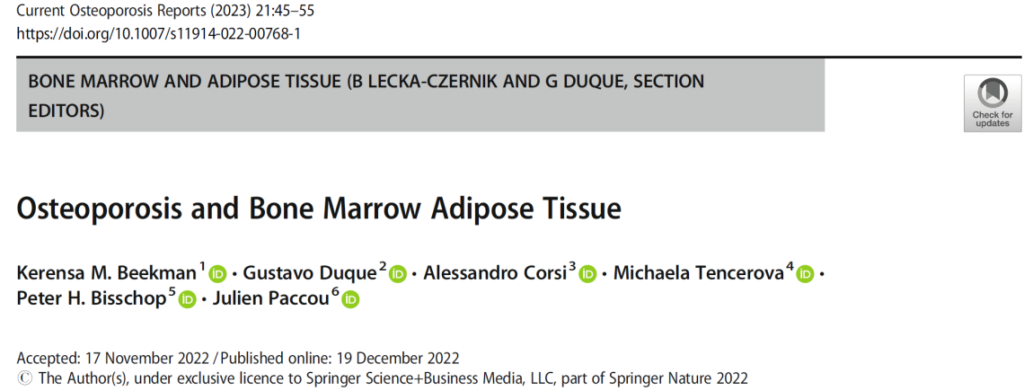Review on the role of bone marrow adipose tissue in osteoporosis
The Working Group on Applications of Clinical and Translational Research published their review on the role of bone marrow adipose tissue in osteoporosis in Current Osteoporosis Reports in February 2023 (link)
Abstract
Purpose of review: This review focuses on the recent findings regarding bone marrow adipose tissue (BMAT) concerning bone health. We summarize the variations in BMAT in relation to age, sex, and skeletal sites, and provide an update on noninvasive imaging techniques to quantify human BMAT. Next, we discuss the role of BMAT in patients with osteoporosis and interventions that affect BMAT.
Recent findings: There are wide individual variations with region-specific fluctuation and age- and gender-specific differences in BMAT content and composition. The Bone Marrow Adiposity Society (BMAS) recommendations aim to standardize imaging protocols to increase comparability across studies and sites. Water-fat imaging (WFI) seems an accurate and efficient alternative for spectroscopy (1H-MRS). Most studies indicate that greater BMAT is associated with lower bone mineral density (BMD) and a higher prevalence of vertebral fractures. The proton density fat fraction (PDFF) and changes in lipid composition have been associated with an increased risk of fractures independently of BMD. Therefore, PDFF and lipid composition could potentially be future imaging biomarkers for assessing fracture risk. Evidence of the inhibitory effect of osteoporosis treatments on BMAT is still limited to a few randomized controlled trials. Moreover, results from the FRAME biopsy sub-study highlight contradictory findings on the effect of the sclerostin antibody romosozumab on BMAT. Further understanding of the role(s) of BMAT will provide insight into the pathogenesis of osteoporosis and may lead to targeted preventive and therapeutic strategies.

